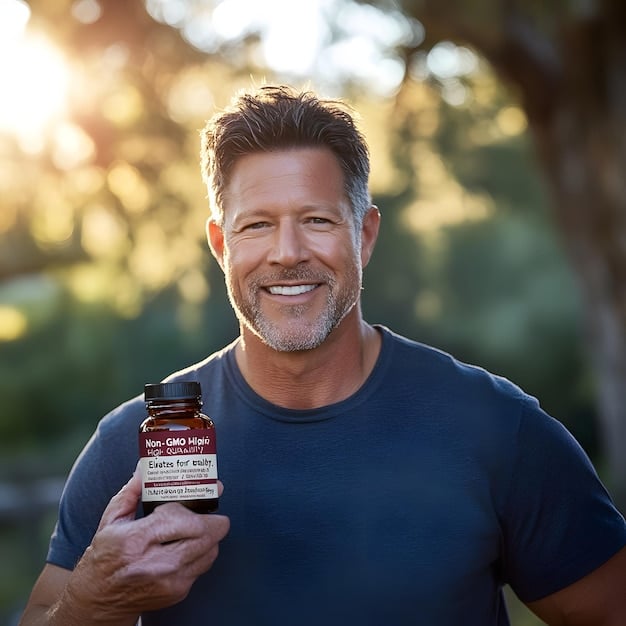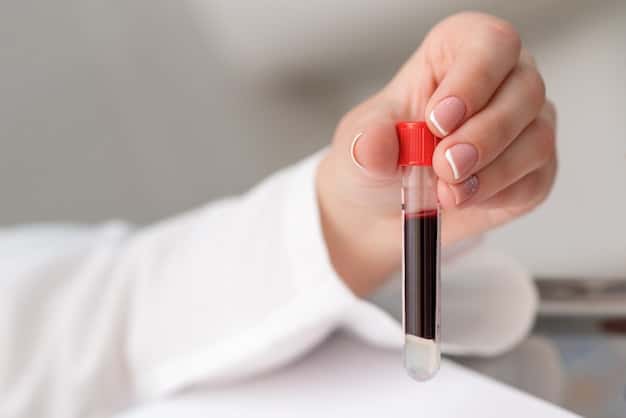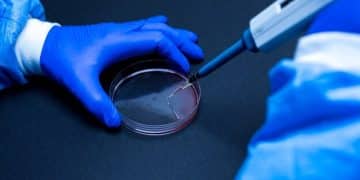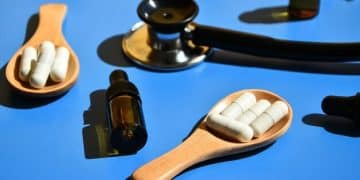Vitamin D and Men’s Sexual Health: A Data-Driven Analysis

Vitamin D supplements play a significant role in improving men’s sexual health by influencing testosterone levels, enhancing sperm quality, and reducing the risk of erectile dysfunction, as supported by data-driven analysis of various clinical studies and research findings.
Can a simple vitamin boost your sexual health? This article explores the role of vitamin D supplements in improving men’s sexual health: a data-driven analysis, delving into the science behind this essential nutrient and its impact on male vitality.
Understanding Vitamin D and Men’s Health
Vitamin D, often dubbed the “sunshine vitamin,” is crucial for overall health. But what’s its specific connection to men’s health? This section will explore that connection, highlighting Vitamin D deficiency and its effects on the male body.
Vitamin D plays several essential roles in the body, including bone health, immune function, and mood regulation. Recent research suggests it also has a significant impact on men’s sexual health, affecting everything from testosterone levels to erectile function and fertility.
Vitamin D Deficiency: A Growing Concern
Vitamin D deficiency is surprisingly common, especially in regions with limited sunlight. It’s important to know if you may be deficient and to understand the symptoms.
- Increased fatigue and weakness
- Bone and muscle pain
- Depressed mood
- Impaired immune function

The Link Between Vitamin D and Testosterone
The relationship between vitamin D and testosterone is a key area of interest in men’s health. Studies have shown that adequate vitamin D levels are associated with higher testosterone levels.
Low levels of vitamin D can negatively affect testosterone production, which is vital for sexual function, muscle mass, and overall energy. Ensuring sufficient vitamin D intake may help maintain healthy testosterone levels.
In summary, Vitamin D Deficiency can reduce testosterone, which can lead to serious issues. Addressing this deficiency head on is key to helping curb these issues.
Vitamin D and Testosterone: A Closer Look
Testosterone is a crucial hormone in men, influencing a variety of functions. Let’s delve deeper into how Vitamin D affects this hormone and its impact on male health.
Testosterone is a primary sex hormone responsible for the development of male characteristics. It influences muscle mass, bone density, red blood cell production, and sexual function. Maintaining healthy testosterone levels is essential for overall male health and well-being.
The Science Behind Vitamin D and Testosterone Production
Vitamin D is believed to influence testosterone production through its interaction with the androgen receptor in the testes. Additionally, vitamin D may affect the enzymes involved in testosterone synthesis.
Research indicates that vitamin D supplementation can increase testosterone levels, particularly in men who are deficient. However, the exact mechanisms and the extent of this effect are still under investigation.
Studies on Vitamin D and Testosterone
Several studies have investigated the relationship between vitamin D and testosterone. These studies provide valuable insights into the potential benefits of vitamin D supplementation for men with low testosterone levels.
- A study published in the journal “Hormone and Metabolic Research” found that vitamin D supplementation increased testosterone levels in men with vitamin D deficiency.
- Another study in the “Clinical Endocrinology” journal showed that vitamin D supplementation improved sexual function and mood in men with low testosterone.
- These findings suggest that maintaining adequate vitamin D levels may have a positive impact on testosterone and overall male health.
Ultimately, Vitamin D and Testosterone play a significant part in men’s health. There are numerous studies and data that support the importance of keeping appropriate levels of both.
The Impact of Vitamin D on Erectile Function
Erectile dysfunction (ED) is a common concern for many men. It’s important to understand how Vitamin D plays a part in managing and preventing this condition.
Erectile dysfunction (ED) is the inability to achieve or maintain an erection firm enough for satisfactory sexual intercourse. It can be caused by various factors, including cardiovascular disease, diabetes, hormonal imbalances, and psychological issues.
Vitamin D and Blood Vessel Health
Vitamin D plays a role in maintaining healthy blood vessels, which are essential for proper erectile function. Vitamin D can help protect the cells that line blood vessels and regulate blood pressure.
Adequate levels of vitamin D may improve blood flow to the penis, thus reducing the risk of ED. Additionally, vitamin D has anti-inflammatory properties that can protect blood vessels from damage.
Research Linking Vitamin D to ED
Several studies have examined the connection between vitamin D and ED. These studies suggest that men with vitamin D deficiency are more likely to experience erectile dysfunction.
- A study published in the “Journal of Sexual Medicine” found that men with ED had significantly lower vitamin D levels compared to men without ED.
- Another study in the “Andrology” journal showed that vitamin D supplementation improved erectile function in men with vitamin D deficiency and ED.
- These findings indicate that optimizing vitamin D levels may be a beneficial strategy for preventing and treating ED.
In short, if you’re looking for ways to improve erectile dysfunction, make sure you’re consulting with your doctor about Vitamin D Supplements.
Vitamin D’s Role in Sperm Quality and Fertility
Fertility is another key area of concern for men. It’s important to explore the connection between Vitamin D and sperm quality, as well as potential benefits.
Sperm quality refers to various factors, including sperm count, motility (the ability of sperm to move), and morphology (the shape of sperm). These factors are crucial for successful fertilization and male fertility.
How Vitamin D Affects Sperm Health
Vitamin D is believed to influence sperm quality through its effects on calcium regulation, cell differentiation, and immune function. Vitamin D receptors are found in sperm cells, where they may play a role in sperm development and maturation.
Adequate levels of vitamin D may improve sperm count, motility, and morphology, thus enhancing male fertility. Additionally, vitamin D has antioxidant properties that can protect sperm cells from oxidative damage.

Studies on Vitamin D and Male Infertility
Research has shown that men with vitamin D deficiency are more likely to experience infertility. Supplementation may improve sperm parameters in infertile men.
- A study published in the “Asian Journal of Andrology” found that vitamin D supplementation improved sperm motility in men with vitamin D deficiency and infertility.
- Another study in the “International Journal of Fertility and Sterility” showed that vitamin D supplementation increased pregnancy rates in couples undergoing infertility treatment.
- These findings suggest that optimizing vitamin D levels may be a valuable approach for improving male fertility.
Overall, it’s important to maintain a healthy dose of Vitamin D if you’re concerned about fertility.
Sources of Vitamin D: Diet and Supplements
How can men ensure they’re getting enough Vitamin D? Let’s explore the available sources, including diet and supplements.
Vitamin D can be obtained from various sources, including sunlight exposure, diet, and supplements. However, many men may not get enough vitamin D from sunlight and diet alone, especially during the winter months or if they have limited outdoor activities.
Dietary Sources of Vitamin D
Few foods naturally contain high levels of vitamin D. However, some foods are fortified with vitamin D, which can help increase your intake.
Fatty fish like salmon, mackerel, and tuna are good sources of vitamin D. Other dietary sources include egg yolks, fortified milk, and fortified cereals.
Choosing the Right Vitamin D Supplement
Vitamin D supplements are available in two forms: vitamin D2 (ergocalciferol) and vitamin D3 (cholecalciferol). Vitamin D3 is generally considered more effective at raising vitamin D levels in the blood.
When choosing a vitamin D supplement, look for a high-quality product from a reputable brand. Consider the dosage, form (tablets, capsules, or liquid), and any potential interactions with other medications or supplements.
Maintaining healthy habits and a healthy diet can also contribute to an individual’s overall Vitamin D level.
Practical Tips for Increasing Vitamin D Levels
Increasing your Vitamin D levels doesn’t have to be difficult. This section will offer practical strategies to boost your Vitamin D intake.
Increasing vitamin D levels involves a combination of sunlight exposure, diet, and supplementation. By following these practical tips, men can optimize their vitamin D levels and support their overall health.
Safe Sunlight Exposure
Sunlight exposure is a natural way to boost vitamin D production in the skin. Aim for 15-30 minutes of sun exposure daily, preferably during midday when the sun’s rays are strongest.
Expose as much skin as possible without sunscreen to maximize vitamin D synthesis. However, be mindful of the risk of sunburn and skin damage, especially if you have sensitive skin.
Incorporating Vitamin D-Rich Foods into Your Diet
Include vitamin D-rich foods in your diet to increase your intake. Fatty fish, egg yolks, and fortified foods are good sources of vitamin D.
Read nutrition labels to identify foods that are fortified with vitamin D. Additionally, consider consulting with a registered dietitian for personalized dietary recommendations.
The Importance of Vitamin D Supplementation
If you are unable to get enough vitamin D from sunlight and diet alone, consider taking a vitamin D supplement. A daily dose of 1000-2000 IU (International Units) is generally safe and effective for most adults.
- Consult with your healthcare provider to determine the appropriate dosage for your individual needs.
- Monitor your vitamin D levels through regular blood tests to ensure you are within the optimal range.
Ultimately, there are a variety of different ways to help increase your Vitamin D levels. However, it’s important to know what method is best for you, so consult your doctor if you’re ever unsure.
| Key Point | Brief Description |
|---|---|
| ☀️ Vitamin D & Testosterone | Vitamin D supports healthy testosterone levels in men. |
| 💪 Erectile Function | Vitamin D improves blood vessel health, crucial for erectile function. |
| 🌱 Sperm Quality | Optimal Vitamin D levels enhance sperm quality and male fertility. |
| 💊 Supplementation | Supplements can help if sun and diet aren’t enough; consult a doctor for dosage. |
Frequently Asked Questions (FAQ)
▼
The recommended daily intake of vitamin D for men is typically 600-800 IU (International Units). However, some individuals may require higher doses, especially if they have a deficiency. It is best to consult with a healthcare provider for personalized recommendations.
▼
Research suggests that vitamin D supplementation may improve erectile function in men with vitamin D deficiency and ED. Vitamin D helps improve blood vessel health, which is essential for proper erectile function; however, you should always consult with your doctor.
▼
The best dietary sources of vitamin D include fatty fish (such as salmon, mackerel, and tuna), egg yolks and fortified foods (such as milk and cereals). Try and incorporate these foods into your diet to help increase your Vitamin D levels.
▼
The time it takes to see the effects of vitamin D supplementation can vary depending on individual factors such as severity of depletion. Some individuals may experience improvements within a few weeks. Others may take several months to note changes.
▼
Vitamin D supplements are generally safe when taken as directed. However, excessive doses can lead to hypervitaminosis D, which can cause symptoms such as nausea, vomiting, weakness, and kidney problems. Always consult with your doctor before starting any new supplement.
Conclusion
In conclusion, the role of vitamin D supplements in improving men’s sexual health: a data-driven analysis is clear: Maintaining optimal vitamin D levels can positively impact testosterone production, erectile function, and sperm quality, contributing to overall vitality and reproductive health in men. Although more research is always needed.





